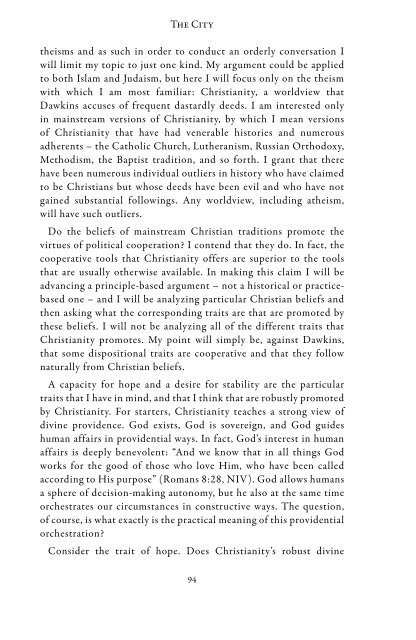THE CITY
h6c7p5d
h6c7p5d
Create successful ePaper yourself
Turn your PDF publications into a flip-book with our unique Google optimized e-Paper software.
The City<br />
theisms and as such in order to conduct an orderly conversation I<br />
will limit my topic to just one kind. My argument could be applied<br />
to both Islam and Judaism, but here I will focus only on the theism<br />
with which I am most familiar: Christianity, a worldview that<br />
Dawkins accuses of frequent dastardly deeds. I am interested only<br />
in mainstream versions of Christianity, by which I mean versions<br />
of Christianity that have had venerable histories and numerous<br />
adherents – the Catholic Church, Lutheranism, Russian Orthodoxy,<br />
Methodism, the Baptist tradition, and so forth. I grant that there<br />
have been numerous individual outliers in history who have claimed<br />
to be Christians but whose deeds have been evil and who have not<br />
gained substantial followings. Any worldview, including atheism,<br />
will have such outliers.<br />
Do the beliefs of mainstream Christian traditions promote the<br />
virtues of political cooperation? I contend that they do. In fact, the<br />
cooperative tools that Christianity offers are superior to the tools<br />
that are usually otherwise available. In making this claim I will be<br />
advancing a principle-based argument – not a historical or practicebased<br />
one – and I will be analyzing particular Christian beliefs and<br />
then asking what the corresponding traits are that are promoted by<br />
these beliefs. I will not be analyzing all of the different traits that<br />
Christianity promotes. My point will simply be, against Dawkins,<br />
that some dispositional traits are cooperative and that they follow<br />
naturally from Christian beliefs.<br />
A capacity for hope and a desire for stability are the particular<br />
traits that I have in mind, and that I think that are robustly promoted<br />
by Christianity. For starters, Christianity teaches a strong view of<br />
divine providence. God exists, God is sovereign, and God guides<br />
human affairs in providential ways. In fact, God’s interest in human<br />
affairs is deeply benevolent: “And we know that in all things God<br />
works for the good of those who love Him, who have been called<br />
according to His purpose” (Romans 8:28, NIV). God allows humans<br />
a sphere of decision-making autonomy, but he also at the same time<br />
orchestrates our circumstances in constructive ways. The question,<br />
of course, is what exactly is the practical meaning of this providential<br />
orchestration?<br />
Consider the trait of hope. Does Christianity’s robust divine<br />
94


